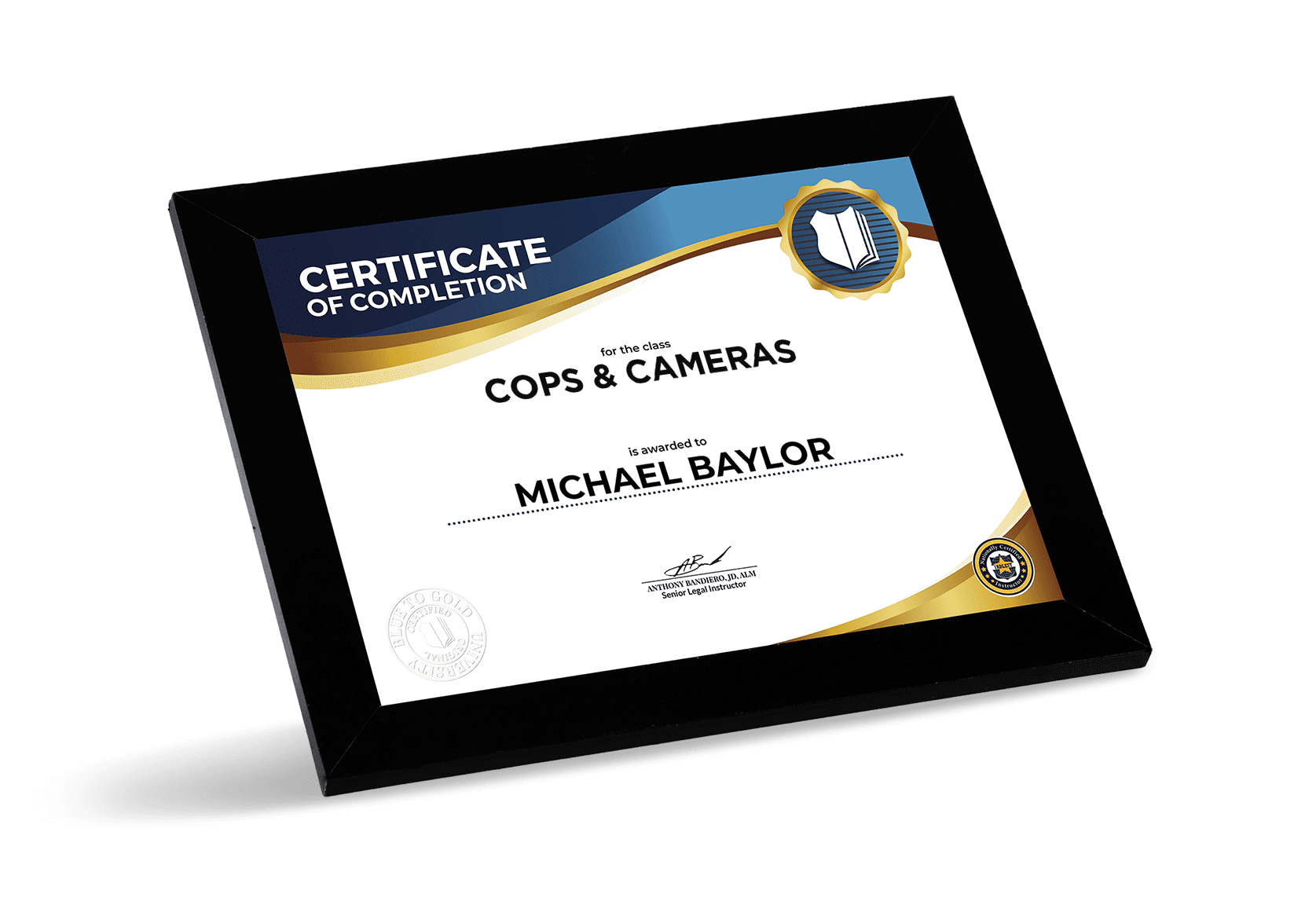Module One: Course Introduction – 10 minutes
1. Instructor Introduction.
2. Explain the course objective.
3. Encourage attendees to ask questions and share feedback with other attendees.
4. Explain that certificates will be emailed after the class
5. Go over the three disclaimers:
- Laws and agency standard operating procedures may be more restrictive. Blue to Gold is teaching the federal standard unless otherwise Therefore, students must know their state and local requirements in addition to the federal standard.
- If students have any doubts about their actions, ask a supervisor or legal advisor.
- The course is not legal advice, but legal education. Therefore, nothing we teach should be interpreted as legal advice. Check with your agency’s legal advisor for legal
Module Two: The Law
1. Legal Rule: The First Amendment is one of the most protected rights in the Constitution.
2. In the face of verbal challenges to police action, officers must respond with restraint. We are mindful that the preservation of liberty depends in part upon the maintenance of social order. But the First Amendment recognizes, wisely we think, that a certain amount of expressive disorder not only is inevitable in a society committed to individual freedom but must itself be protected if that freedom would survive. U.S. Supreme Court
3. “the First Amendment protects a significant amount of verbal criticism and challenge directed at police officers.” S. Supreme Court
4. Video: “Trooper Nieves Russel Bartlett
5. Legal Rule: Probable cause is generally a defense to a First Amendment retaliation claim
6. Legal Rule: However, if the suspect can prove that you were primarily motivated to penalize his speech, he may win
7. Case Sample: After Lozman towed his floating home into a marina owned by the City, he became an outspoken critic of the City’s plan to condemn waterfront homes for private development. He filed suit, alleging that the City’s approval of a development agreement violated Florida’s open-meetings The Council held a closed-door session and discussed Lozman’s lawsuit. He alleges that the meeting’s transcript shows that councilmembers devised an official plan to intimidate him. Months later, the Council held a public meeting. Lozman spoke about the arrests of officials from other jurisdictions. When he refused a councilmember’s request to stop making his remarks, a police officer was told to “carry him out.” The officer handcuffed Lozman and ushered him out, allegedly for violating the Council’s rules of procedure by discussing issues unrelated to the City and refusing to leave the podium. The State’s attorney determined that there was probable cause for his arrest but dismissed the charges. Lozman filed suit under 42 U.S.C. 1983. The district court instructed the jury that, for Lozman to prevail on his retaliatory arrest claim, he had to prove that the officer was motivated by impermissible animus against Lozman’s protected speech and lacked probable cause to make the arrest. The Eleventh Circuit affirmed a judgment for the City. The Supreme Court vacated. The existence of probable cause does not bar Lozman’s First Amendment retaliation claim because his case, is “far afield from the typical retaliatory arrest claim.” Lozman must prove the existence and enforcement of an official policy motivated by retaliation which is unlike an on-the- spot decision by an individual officer. The Court noted that Lozman alleges that the City deprived him of the right to petition, “one of the most precious of the liberties safeguarded by the Bill of Rights.”
8. Example of Officers Violating First Amendment
9. Pro Tip: The key is to not focus on the criticism, but how the person’s conduct substantially prevented you from doing your job
10. Case Samples: Arrested suspect wanted to pray before being transported to jail and the deputy refused. Synopsis: For example, if an officer places a suspect under arrest and orders the suspect to enter a police vehicle for transportation to jail, the suspect does not have a right to delay that trip by insisting on first engaging in conduct that, at another time, would be protected by the First Amendment. When an officer’s order to stop, praying is alleged to have occurred during the course of investigative conduct that implicates Fourth Amendment rights, the First and Fourth Amendment issues may be inextricable. Held: A person has no right to delay an arrest to engage in religious practices.
11. Legal Rule: Three categories not protected: (a) Incitement or fighting words, (b) Obscenity, (c) True threats
12. Case Sample: Unlawful camper emailed the police and said that he was “armed and will now fire on all Sheriff and Fish and Game after this email. People v. Nishi. Held: Emails was not protected under the First Amendment.
Module Three: First Amendment Auditors
1. Auditors Want Three Things
2. Legal Rule: It is not illegal or reasonable suspicion to: (a) record a public officer, (b) engaged in public act, (c) in a public places
3. Video: “First Amendment Violation?”
4. Pro Tip: You know the difference between auditor and a criminal: (a) words they use (b) actions scream “contact me!” (c) they push the legal envelope (d) many tell you they are engaged in 1A activities.
5. Video: “How to Handle 1A Auditors”
6. Pro Tip: The best way to handle 1A auditors is to leave them alone
Module Four: Protestors
1. Legal Rule: At the core of the First Amendment is the right to protest the government
2. Pro Tip: The First Amendment protects profanity and offensive ideas during a lawful protest the government
3. Case Sample: Person was arrested inside courthouse because he wore a jacket that said, “Fuck the ” Synopsis: The state argued that Cohen’s jacket constituted fighting words under Chaplinsky. The Supreme Court disagreed. The Court noted that the words on the jacket were not a “direct personal insult”3 and there was “no showing that anyone who saw Cohen was in fact violently aroused or that appellant [Cohen] intended such a result.” Then, in oft-cited language, Justice Harlan wrote while the four-letter word being litigated here is perhaps more distasteful than most others of its genre, it is nevertheless often true that one man’s vulgarity is another’s lyric. Indeed, we think it is largely because governmental officials cannot make principled distinctions in this area that the Constitution leaves manners of taste and style so largely to the individual. Held: “While the particular four-letter word…here is perhaps more distasteful than most others of its genre, it is nevertheless often true that one man’s vulgarity is another’s lyric…the Constitution leaves manners of taste and style…to the individual.”
4. Legal Rule: Police may regulate the time, place, and manner of speech if there is a legitimate need
5. What would you do? Could you stop a person from yelling religious messages in a neighborhood at 3 am? Does a person have a 1A right to beg for money? What if that same person was screaming at people to give him money?
6. In this next video the protestor has a “Fuck City Hall” sign
7. Video: “First Amendment Violation?”
8. What would you do? What are the legal issues here?
9. Case Sample: Speech cannot be restricted simply because it is upsetting or arouses contempt. “If there is a bedrock principle underlying the First Amendment, it is that the government may not prohibit the expression of an idea simply because society finds the idea itself offensive or ” Synopsis: Given that Westboro’s speech was at a public place on a matter of public concern, that speech is entitled to “special protection” under the First Amendment. Such speech cannot be restricted simply because it is upsetting or arouses contempt. “If there is a bedrock principle underlying the First Amendment, it is that the government may not prohibit the expression of an idea simply because society finds the idea itself offensive or disagreeable.” Texas v. Johnson
Module Four: Contempt of Cop
1. A District of Columbia jury late yesterday awarded $97,500 in compensatory and punitive damages against the District of Columbia and two C. Metropolitan Police Department officers for unconstitutionally arresting Lindsay Huthnance in November 2005 outside a convenience store in the Mount Pleasant neighborhood of Washington, D.C. When Ms. Huthnance entered a 7-Eleven and saw several police officers inside, she made a comment to her boyfriend about the apparent waste of taxpayer money. Taking offense, two officers followed her outside, stopped her, and demanded her ID. When Ms. Huthnance questioned their right to demand her ID and asked for one officer’s badge number, the officer ordered her to get up against the wall, searched her and arrested her for disorderly conduct. She was held in a stationhouse cellblock until the next morning, then released without charges. Held: Citizen awarded $97,500
2. Video: “I Pay Your Salary”
3. Per 6th Circuit Court of Appeals: Fits of rudeness or lack of gratitude may violate the golden rule…But that doesn’t make them illegal or for that matter punishable or grounds for a seizure
4. Case Sample: While on a traffic stop, a car drove by and yelled “fuck you” to a trooper. Trooper then stopped the suspect for a “noise violation.” Synopsis: The Eighth Circuit affirmed the district court’s denial of summary judgment based on qualified immunity to a state trooper, in an action brought by plaintiff alleging claims of First Amendment retaliation and Fourth Amendment unreasonable seizure. The trooper arrested plaintiff for disorderly conduct after plaintiff yelled a two-word expletive at him from a moving vehicle. The trooper believed the shout constituted unreasonable or excessive noise in violation of state law. The court held that the trooper lacked even arguable probable cause for an arrest and thus violated plaintiff’s Fourth Amendment right to be free from unreasonable seizure. In this case, plaintiff’s conduct may have been offensive, but it was not an unreasonable or excessive noise. The court also held that the district court did not err as to the First Amendment retaliation claim where the trooper had neither probable cause nor arguable probable cause to arrest plaintiff, because plaintiff’s profane shout was protected activity and the arrest was an action that would chill continued activity by a person of ordinary firmness. Thiraiajah v. Hollenbeck.
Held: Trooper personally liable for money damages.
5. Video: “First Amendment Violation?”
6.
7.
8.
9.
10.
11.
12. Pro Tip: Someone “taking your focus away” is not obstruction! Obstruction requires some physical intervention, substantial interferences, or legitimate safety concern
Module Five: Takeaways












